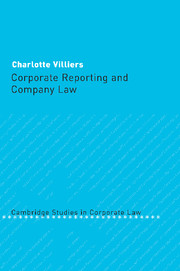Book contents
- Frontmatter
- Contents
- Preface
- Table of legislation
- Table of cases
- Introduction
- PART I GENERAL ISSUES
- PART II FINANCIAL REPORTING
- PART III NARRATIVE REPORTING
- 9 The Operating and Financial Review
- 10 Social and environmental reporting
- 11 Corporate reporting and employees
- PART IV A WAY FORWARD
- Bibliography
- Index
10 - Social and environmental reporting
Published online by Cambridge University Press: 23 July 2009
- Frontmatter
- Contents
- Preface
- Table of legislation
- Table of cases
- Introduction
- PART I GENERAL ISSUES
- PART II FINANCIAL REPORTING
- PART III NARRATIVE REPORTING
- 9 The Operating and Financial Review
- 10 Social and environmental reporting
- 11 Corporate reporting and employees
- PART IV A WAY FORWARD
- Bibliography
- Index
Summary
Introduction
Whilst the operating and financial review legislation would not have made social and environmental reporting compulsory it might have been regarded as a first step in that direction. Corporate social and environmental reporting has been debated for more than thirty years. The activity was regarded as an experiment in the 1970s but it fell off the agenda during the 1980s. Then in the mid-1990s the possibility of a social accounting requirement returned. Currently, the attention paid to social and environmental reporting gives an impression that it is a widespread corporate activity. A substantial body of guidelines and schemes for effective social and environmental reporting has been developed alongside a wealth of literature and observation of the activity. Yet, despite such attention this aspect of disclosure remains inadequately developed with an insufficient number of companies having established it as an integral part of their reporting agenda. Indeed, there are ‘vast swathes of the economy that have not even begun to disclose information on their social and environmental impact’. In particular, three areas of business engage in little or no social reporting: ‘behind the scenes companies’ without famous reputations or brand names; state-owned and public sector organisations; and small and medium-sized businesses, which represent the vast majority of companies registered in the UK at least.
A number of barriers have obstructed the development of social and environmental reporting. For example, a clear definition of social and environmental reporting has not been established.
- Type
- Chapter
- Information
- Corporate Reporting and Company Law , pp. 228 - 261Publisher: Cambridge University PressPrint publication year: 2006



